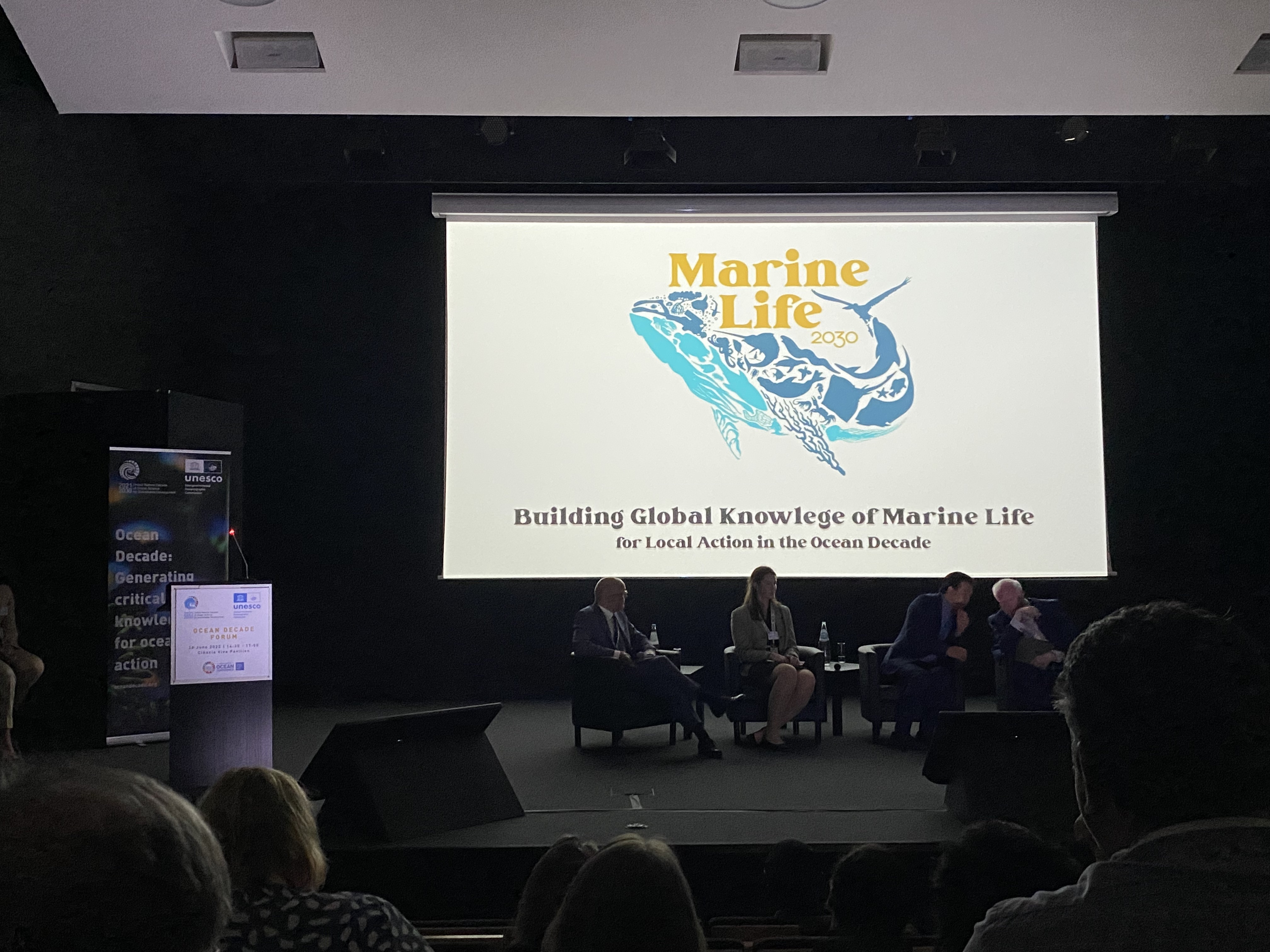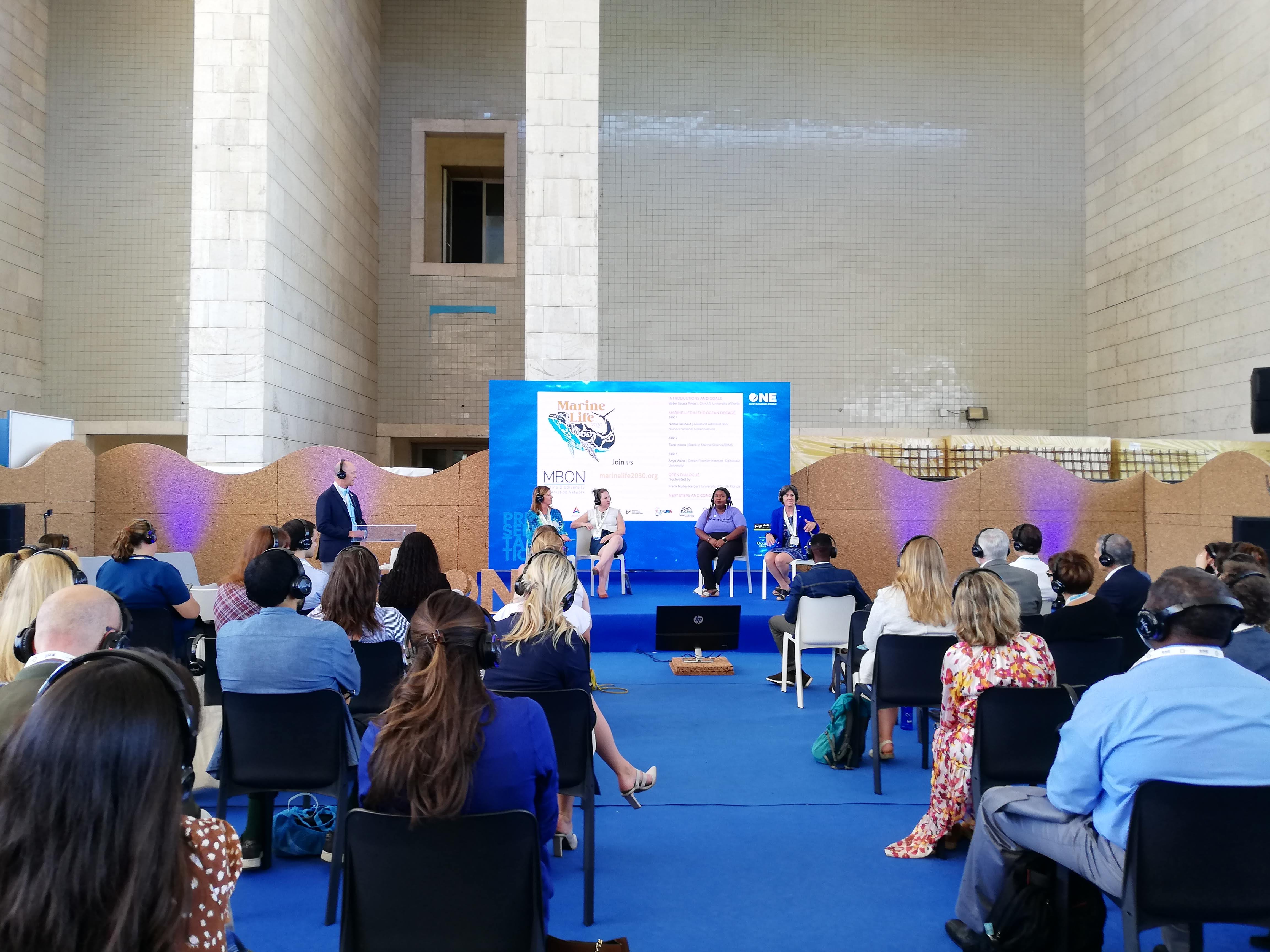Marine Life at the 2022 UN Ocean Conference
The UN Ocean Conference (UNOC), held in Lisbon from 27 June to 1 July 2022, joined Heads of State and Government, thousands of experts, business leaders, scientists, and civil society representatives together, providing a space for meaningful dialogue and seeking collaborations to conserve and conduct responsible use of the oceans for sustainable development (SDG14).
Side Event: Marine life observations: Integrating biology and ecology observations to enable indicators for conservation, restoration, and sustainable development of marine and coastal ecosystems
The Marine Biodiversity Observation Network (MBON) partnered with the Interdisciplinary Centre of Marine and Environmental Research (CIIMAR), the Atlantic International Research Centre (AIR Centre), the National Oceanic and Atmospheric Administration U.S. Integrated Ocean Observation System (U.S. IOOS), the Ocean Best Practices System (OBPS), the Ocean Biodiversity Information System (OBIS), and the Global Ocean Observing System (GOOS) of the Intergovernmental Oceanographic Commission (IOC) to hold an in-person side event on 28 June 2022 as part of the UN Ocean Conference.
Experts and stakeholders reviewed co-design strategies conducted under the Marine Life 2030 Programme of the UN Decade of Ocean Science for Sustainable Development, fostering a dialogue about stakeholder needs for monitoring, information, capacity development, and the production of indicators to support decision-making. The strategy is based on three pillars of action: Learning Together, Observing Life, and Building Solutions. The cross-cutting elements are efforts to share knowledge and build communities, converge on standards for observing and data management, and developing metrics of success through co-design.
The session promoted the integration of biological and ecological observations into coastal and ocean observing systems and monitoring programs; best practices that allow for the information to be interoperable, scalable, and usable; collaborations that are in place to support marine life monitoring and to exchange and adapt knowledge for the benefit of human communities; and identifying gaps in knowledge and understanding. The implementation includes the MBON Pole to Pole framework for local observations of marine life and biodiversity using a basin-scale framework for interoperability, building on regional elements of the GOOS and guidelines for data flow developed by OBIS and OBPS.
This goal is to better manage ocean uses and to satisfy national reporting requirements for targets of Sustainable Development Goals, the post-2020 Convention on Biological Diversity, and other national and international frameworks based on better, more accessible, and timely information about marine life, including biodiversity, the distribution of species, productivity and ecosystem function, and how this is changing over time.
Participants developed the following statement as an outcome of the side event.

Marine Life 2030 at the UN Ocean Decade Forum
A Marine Life 2030 video was showcased at the UN Ocean Decade Forum held on 30 June 2022. This side event celebrated the challenges and outcomes envisioned for the UN Ocean Decade in science, innovation, and technology, as well as changes in society required for sustainable uses of the ocean. The Forum showcased several endorsed UN Ocean Decade Actions and provided a space for announcements from partners.

Marine Life 2030 Attendance at UNOC Side Events
Representatives from the Marine Life 2030 Programme also attended many other side events during UNOC, including:
-
The _One Sustainable Ocean Ocean Science & Business2Sea_ official side-event. - Ocean Acidification Research for Sustainability
- Ocean Acidification: Co-designing data connections to underserved communities for equitable outcomes
- Integrating Marine Litter Monitoring to Inform Action.
- GOA-ON’s Ocean Decade Programme: Ocean Acidification Research for Sustainability (OARS)
- Biomolecular Observations in Support of Conservation and Sustainable Development.
- A call to Action from artisanal fishing communities, essential users of the oceans
- Digital Ocean Systems to Support and Strengthen Implementation of Sustainable Development Goals
- Biodiversity For A Resilient Planet: A Deeper Look